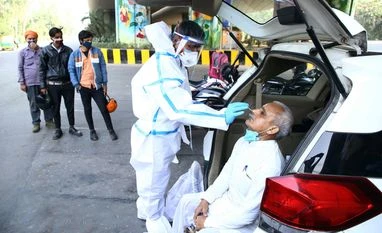Frequent, rapid testing can curb Covid transmission within weeks: US Study
Testing half the population weekly with inexpensive, rapid-turnaround Covid-19 tests can drive the pandemic toward elimination within weeks, a new study says
)
A medical staff collects a swab sample of a man for the Covid-19 during random testing of the people traveling from Delhi to Noida as the cases increase
Testing half the population weekly with inexpensive, rapid-turnaround COVID-19 tests can drive the pandemic toward elimination within weeks even if the tests are significantly less sensitive than gold-standard clinical diagnostics, a new study says.
The research, published in the journal Science Advances, noted that such a strategy could lead to "personalised stay-at-home orders" without shutting down restaurants, bars, retail stores and schools.
According to the scientists, including those from the University of Colorado at Boulder in the US, the sensitivity levels of the different types of COVID-19 tests currently used across the world vary widely.
Antigen tests require a relatively high viral load -- about 1,000 times as much virus compared to the PCR test -- to detect an infection, they said.
Another test, known as RT-lamp can detect the virus at around 100 times as much virus compared to the PCR, the study noted.
Also Read
The scientists added that the benchmark PCR test requires as little as 5,000 to 10,000 copies of the viral genetic material, RNA, per milliliter of sample -- meaning it can catch the virus very early or very late.
"Our big picture finding is that, when it comes to public health, it's better to have a less sensitive test with results today than a more sensitive one with results tomorrow," said study lead author Daniel Larremore from the University of Colorado at Boulder in the US.
"Rather than telling everyone to stay home so you can be sure that one person who is sick doesn't spread it, we could give only the contagious people stay-at-home orders so everyone else can go about their lives," Larremore said.
In the study, the scientists assessed whether test sensitivity, frequency, or turnaround time is most important to curb the spread of COVID-19.
They analysed available literature on how viral load climbs and falls inside the body during infection, when people tend to experience symptoms, and when they become contagious.
Using mathematical modelling the scientists forecasted the impact of screening with different kinds of tests on three hypothetical scenarios -- in 10,000 individuals; in a university-type setting of 20,000 people; and in a city of 8.4 million.
They found that when it came to curbing spread, the frequency and turnaround time are much more important than test sensitivity.
Citing a hypothetical example, the researchers said in a large city, widespread twice-weekly testing with a rapid, but less sensitive test, reduced the degree of infectiousness of the virus by 80 per cent.
But twice-weekly testing with a more sensitive PCR test, which takes up to 48 hours to return results, reduced infectiousness by only 58 per cent, the study noted.
When the amount of testing was the same, it said the rapid test always reduced infectiousness better than the slower, more sensitive PCR test.
This is because about two-thirds of infected people have no symptoms, and as they await their results, they continue to spread the virus, the scientists explained.
"This paper is one of the first to show we should worry less about test sensitivity and, when it comes to public health, prioritise frequency and turnaround," said study senior author Roy Parker from the Howard Hughes Medical Institute in the US.
The researchers believe the findings demonstrate the power of frequent testing in shortening the pandemic and saving lives.
In one scenario, in which four per cent of individuals in a city were already infected, they said rapid testing three out of four people every three days reduced the number ultimately infected by 88 per cent and was "sufficient to drive the epidemic toward extinction within six weeks."
"These rapid tests are contagiousness tests. They are extremely effective in detecting COVID-19 when people are contagious," said Michael Mina, another co-author of the study from the Harvard T.H. Chan School of Public Health in the US.
Some rapid tests, he added can return results in 15 minutes while the PCR tests can take several days.
"Within a few weeks we could see this outbreak going from huge numbers of cases to very manageable levels," Mina said.
The researchers believe it is time to change the COVID-19 testing strategy from something made available to those with symptoms, to thinking of it as a vital tool for breaking transmission chains.
(Only the headline and picture of this report may have been reworked by the Business Standard staff; the rest of the content is auto-generated from a syndicated feed.)
More From This Section
Don't miss the most important news and views of the day. Get them on our Telegram channel
First Published: Nov 22 2020 | 3:21 PM IST
